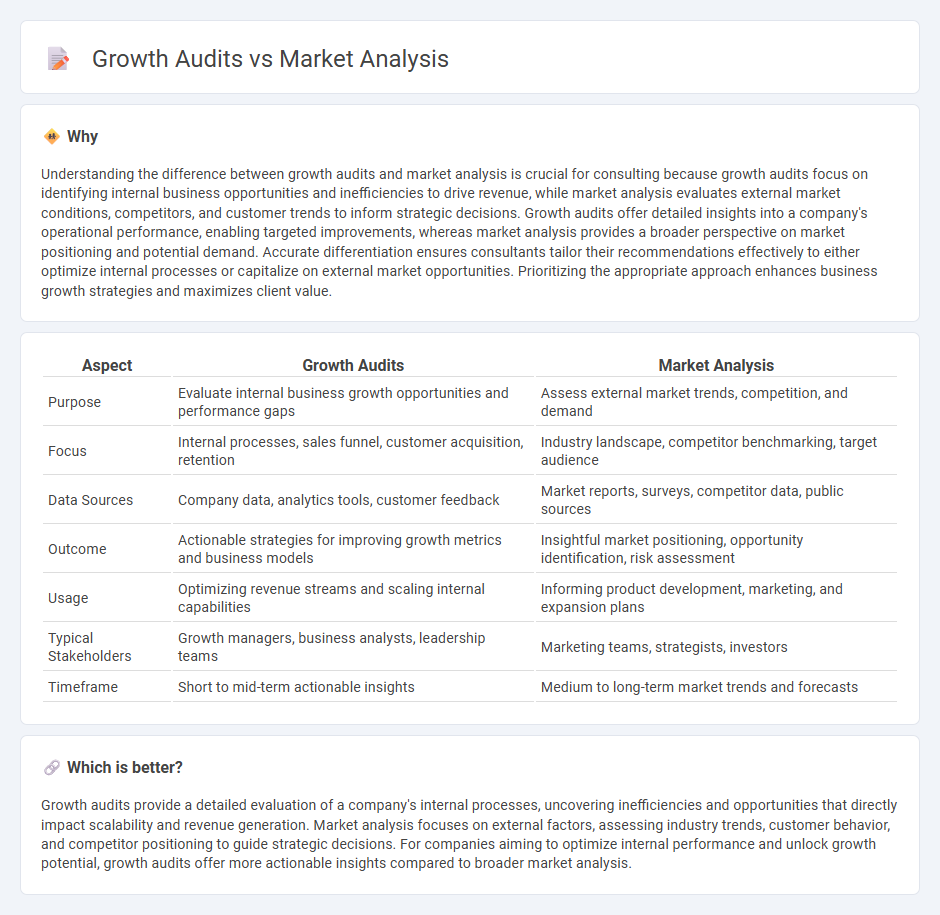
Growth audits evaluate a company's internal processes, customer acquisition strategies, and revenue streams to identify opportunities for scalable expansion. Market analysis focuses on external factors such as industry trends, competitor performance, and target audience behavior to inform strategic positioning. Discover how integrating growth audits and market analysis can transform your business strategy.
Why it is important
Understanding the difference between growth audits and market analysis is crucial for consulting because growth audits focus on identifying internal business opportunities and inefficiencies to drive revenue, while market analysis evaluates external market conditions, competitors, and customer trends to inform strategic decisions. Growth audits offer detailed insights into a company's operational performance, enabling targeted improvements, whereas market analysis provides a broader perspective on market positioning and potential demand. Accurate differentiation ensures consultants tailor their recommendations effectively to either optimize internal processes or capitalize on external market opportunities. Prioritizing the appropriate approach enhances business growth strategies and maximizes client value.
Comparison Table
| Aspect | Growth Audits | Market Analysis |
|---|---|---|
| Purpose | Evaluate internal business growth opportunities and performance gaps | Assess external market trends, competition, and demand |
| Focus | Internal processes, sales funnel, customer acquisition, retention | Industry landscape, competitor benchmarking, target audience |
| Data Sources | Company data, analytics tools, customer feedback | Market reports, surveys, competitor data, public sources |
| Outcome | Actionable strategies for improving growth metrics and business models | Insightful market positioning, opportunity identification, risk assessment |
| Usage | Optimizing revenue streams and scaling internal capabilities | Informing product development, marketing, and expansion plans |
| Typical Stakeholders | Growth managers, business analysts, leadership teams | Marketing teams, strategists, investors |
| Timeframe | Short to mid-term actionable insights | Medium to long-term market trends and forecasts |
Which is better?
Growth audits provide a detailed evaluation of a company's internal processes, uncovering inefficiencies and opportunities that directly impact scalability and revenue generation. Market analysis focuses on external factors, assessing industry trends, customer behavior, and competitor positioning to guide strategic decisions. For companies aiming to optimize internal performance and unlock growth potential, growth audits offer more actionable insights compared to broader market analysis.
Connection
Growth audits identify strengths and weaknesses in a company's expansion strategies by analyzing sales data, customer engagement, and operational efficiency. Market analysis provides valuable insights into industry trends, competitor performance, and customer needs, forming a foundation for informed decision-making. Together, these tools enable consultants to develop targeted growth plans that align internal capabilities with external market opportunities.
Key Terms
Market Segmentation
Market analysis provides a comprehensive overview of industry trends, competitor positioning, and customer demographics, focusing on broad market segmentation to identify potential opportunities. Growth audits drill down into specific business processes and performance metrics to pinpoint inefficiencies and growth barriers within targeted market segments. Explore in-depth strategies to leverage market segmentation for optimal business scaling and competitive advantage.
Competitive Benchmarking
Market analysis identifies industry trends, customer segments, and competitor positioning to inform strategic decisions. Growth audits evaluate business processes, marketing strategies, and conversion metrics, emphasizing performance gaps against key competitors. Explore how competitive benchmarking bridges these approaches to enhance your market advantage.
Revenue Drivers
Market analysis provides a comprehensive evaluation of external factors such as competition, customer trends, and market demand that influence revenue potential. Growth audits dive deeper into internal processes, identifying revenue drivers within marketing strategies, sales funnels, and product development efficiencies to optimize business growth. Explore detailed insights to leverage both methodologies and maximize your revenue.
Source and External Links
Market analysis -- Wikipedia - A market analysis studies the attractiveness and dynamics of a specific market within an industry, providing insights like SWOT analysis to help define business strategies and focus on the relevant market segments.
How to Conduct a Market Analysis: A Complete Guide for Businesses and Marketers - Market analysis involves gathering and interpreting information about your industry, target audience, competitors, and market forces to identify opportunities, reduce risks, and achieve competitive advantage.
Market Analysis: What It Is and How to Conduct One - Market analysis is a detailed assessment of your target market that helps spot trends, differentiate your business, reduce risks, tailor offerings, and optimize marketing efforts through systematic research steps.
 dowidth.com
dowidth.com